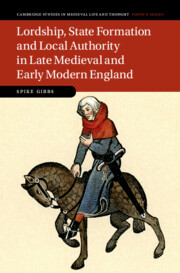ABOUT THE BOOK
Providing a new narrative of how local authority and social structures adapted in response to the decline of lordship and the process of state formation, Spike Gibbs uses manorial officeholding – where officials were chosen from among tenants to help run the lord's manorial estate – as a prism through which to examine political and social change in the late medieval and early modern English village. Drawing on micro-studies of previously untapped archival records, the book spans the medieval/early modern divide to examine changes between 1300 and 1650. In doing so, Gibbs demonstrates the vitality of manorial structures across the medieval and early modern era, the active and willing participation of tenants in these frameworks, and the way this created inequalities within communities
ABOUT THE AUTHOR
Spike Gibbs is Junior Professor for the Economic History of the Middle Ages at the University of Mannheim. His writing on manorial officials, felony forfeiture and managing stray animals has been published in journals such as the Journal of British Studies and the English Historical Review. This is his first book.
TABLE OF CONTENTS
Introduction
1. The changing role of manorial officers and manor courts
2. Manorial officeholding and selection processes: participation or restriction?
3. Manorial officeholding and unfreedom
4. Manorial officeholding and village governance: misconduct and landscape control
5. State formation I: the parish
6. State formation II: vills, quarter sessions and constables
Conclusion
Appendix 1: Categorising presentments
Appendix 2: Identifying individuals
Appendix 3: Population estimates.
More information can be found here.


No comments:
Post a Comment